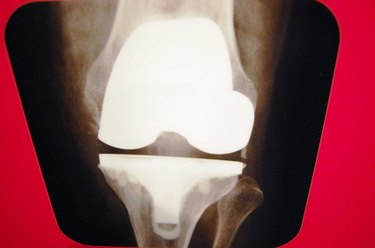
Your shinbone connects to your knee bone. Your knee bone connects to your thighbone. Your ligaments connect these bones to each other. The anterior cruciate ligament, or ACL, runs diagonally across the middle of your knee. It provides rotational stability while preventing your shinbone from slipping out in front of your thighbone. Athletes are highly susceptible to ACL tears. Therapy involves surgical reconstruction and physical therapy. The post-operative period necessitates optimal health and dietary practices.
Post-op Nutrition
Video of the Day
Since anesthesia and sedation impede the protective reflexes that keep your stomach contents from entering your lungs, your doctor will require you to fast before surgery. Some people come out of surgery feeling hungry, but others experience a complete loss of appetite. General anesthesia slows your metabolism, and the post-operative pain medications may cause nausea. Surgeons at Valletta Orthopaedics in San Diego suggest that patients begin with clear liquids and gradually progress their diets each day. If your stomach can tolerate them, nutritional shakes supply important nutrients without overtaxing your digestive system.
Video of the Day
Omega-3 Fatty Acids
Controlling inflammation is an essential part of the healing process. Research scientists at Purdue University in Indiana found that omega-3 fatty acids, found in certain types of fish, assist in post-injury collagen formation and control inflammation. Fish such as herring, salmon, sardines' mackerel, lake trout and albacore tuna are high in omega-3 fatty acids. Adding these food items to your post-operative diet has some serendipitous side benefits. The American heart Association advises that omega-3 fatty acids prevent heart disease, and specialists at the University of Maryland Medical Center state that they also prevent mood swings and depression. The four- to six-month period of post-surgical reduced activity impedes cardiovascular fitness, and previously active patients may develop depression resulting from lack of exercise. Adding fish to your diet may minimize depression as well as the loss of benefits associated with aerobic exercise.
Antioxidants
Nutrients and enzymes called antioxidants combat the substances that cause tissue damage. After ACL surgery, pro-inflammatory molecules called cytokines induce muscle dysfunction, causing muscle atrophy. The antioxidants vitamin C and vitamin E modulate the activity of these cykotines. Researchers at the Linus Pauling Institute speculated that since leg strength is associated with vitamin C content in the bloodstream, vitamin C and vitamin E supplementation may hasten the healing process by reducing inflammation and promoting strength. They gave one group of ACL surgery patients 400 IU of vitamin E and 1,000 mg of vitamin C. The other group received a placebo. After three months, the antioxidant group showed greater strength gains than the placebo group. While these results sound encouraging, physicians are of mixed minds about the use of supplementation. Valletta, for example, warns that supplements after surgery may upset your stomach. Citrus fruits are rich in vitamin C, and wheat germ and grains have large amounts of vitamin E.
Weight Control
Weight gain is inevitable if you continue your training diet in the post-surgical period, according to the American Dietetic Association. The added weight puts additional strain on your knee. Fortunately, within about four weeks, your physical therapist increases the intensity of your rehabilitation sessions, so you start burning more calories. Pedaling on a bicycle to regain range of motion and walking on a treadmill to monitor your gait are two important aspects of ACL rehabilitation. Increase your caloric intake only after your activity level increases. The American Dietetic Association recommends eating foods with low fat but high nutrient content. Spinach, turnips and mangoes are rich in vitamin A, important for cell growth. Baked potatoes, cabbage, tomatoes and cantaloupe offer non-citrus alternatives for vitamin C. Seafood and almonds have a high zinc content, which aids in wound healing.
- Valletta Orthopaedics: ACL General FAQs
- American Heart Association: Fish and Omega-3 Fatty Acids
- University of Maryland Medical Center: Omega-3 Fatty Acids
- Linus Pauling Institute Oregon State University; Vitamins E and C and the Recovery from Anterior Cruciate Ligament Surgery; Tyler Barker, LPI Graduate Fellow
- American Dietetic Association: Nutrition in Rehabilitation and Recovery From Injury